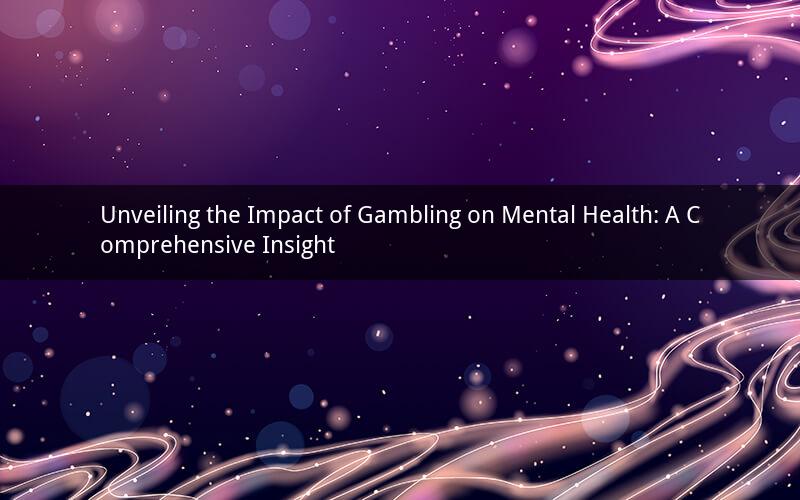
Introduction:
Gambling, once considered a mere form of entertainment, has now become a prevalent issue affecting millions of individuals worldwide. With the advent of online gambling platforms, the accessibility and convenience of gambling have increased exponentially. However, the repercussions of gambling extend beyond financial losses and can have severe implications on mental health. This article delves into the intricate relationship between gambling and mental health, highlighting its effects and the necessary measures to mitigate them.
1. Understanding the Link Between Gambling and Mental Health:
a. The Psychological Effects of Gambling:
Gambling triggers a release of dopamine in the brain, leading to feelings of pleasure and excitement. However, excessive gambling can lead to negative psychological effects such as anxiety, depression, and addiction. These psychological issues often manifest as a result of the constant chase for the thrill and the fear of missing out.
b. The Impact on Cognitive Function:
Gambling can also affect cognitive function, including memory, attention, and decision-making abilities. The constant exposure to high-stakes gambling scenarios can impair these cognitive functions, making individuals more susceptible to making irrational decisions.
2. The Psychological Consequences of Problematic Gambling:
a. Anxiety and Depression:
Individuals with a gambling problem often experience heightened levels of anxiety and depression. The fear of losing, the guilt associated with debt, and the social isolation that follows can exacerbate these psychological conditions.
b. Suicidal Thoughts and Attempts:
In severe cases, problematic gambling can lead to suicidal thoughts and attempts. The overwhelming feelings of hopelessness, despair, and a sense of being trapped can push individuals to the brink of self-harm.
3. The Role of Social Factors in Gambling-Related Mental Health Issues:
a. Family Dynamics:
Family dynamics play a crucial role in the development of gambling-related mental health issues. Children exposed to gambling in their households are more likely to develop gambling problems later in life. Additionally, strained relationships and lack of emotional support can exacerbate the psychological impact of gambling.
b. Peer Influence:
Peer influence can also contribute to the development of gambling-related mental health issues. Individuals surrounded by gambling activities or friends who engage in gambling may be more prone to developing gambling problems themselves.
4. Strategies to Address and Mitigate the Impact of Gambling on Mental Health:
a. Seeking Professional Help:
Individuals struggling with gambling-related mental health issues should seek professional help. Therapists specializing in addiction and mental health can provide effective treatment options, including cognitive-behavioral therapy (CBT) and support groups.
b. Creating a Supportive Environment:
Creating a supportive environment is essential for individuals struggling with gambling-related mental health issues. Encouraging open communication, providing emotional support, and fostering a sense of belonging can significantly improve their well-being.
5. Promoting Responsible Gambling:
a. Awareness and Education:
Raising awareness about the risks associated with gambling is crucial in preventing gambling-related mental health issues. Educating individuals about responsible gambling practices and the potential consequences can help them make informed decisions.
b. Implementing Regulatory Measures:
Governments and regulatory bodies should implement strict regulations to protect individuals from the adverse effects of gambling. This includes age restrictions, deposit limits, and the promotion of responsible gambling resources.
Conclusion:
Gambling, once a mere form of entertainment, has now become a significant concern affecting mental health. Understanding the link between gambling and mental health is crucial in addressing this issue effectively. By promoting responsible gambling, providing professional help, and fostering a supportive environment, we can mitigate the impact of gambling on mental health and create a healthier society.
Questions and Answers:
1. What are the psychological effects of gambling on individuals?
Gambling triggers the release of dopamine in the brain, leading to pleasure and excitement. However, excessive gambling can lead to negative psychological effects such as anxiety, depression, and addiction.
2. How can gambling affect cognitive function?
Gambling can impair cognitive functions such as memory, attention, and decision-making abilities. The constant exposure to high-stakes gambling scenarios can lead to irrational decision-making.
3. What are the consequences of problematic gambling on mental health?
Problematic gambling can lead to negative psychological effects such as anxiety, depression, and addiction. In severe cases, it can also result in suicidal thoughts and attempts.
4. How can family dynamics influence gambling-related mental health issues?
Family dynamics play a crucial role in the development of gambling-related mental health issues. Children exposed to gambling in their households are more likely to develop gambling problems later in life. Strained relationships and lack of emotional support can exacerbate these issues.
5. What are some strategies to address and mitigate the impact of gambling on mental health?
Strategies include seeking professional help, creating a supportive environment, promoting responsible gambling, and implementing regulatory measures to protect individuals from the adverse effects of gambling.